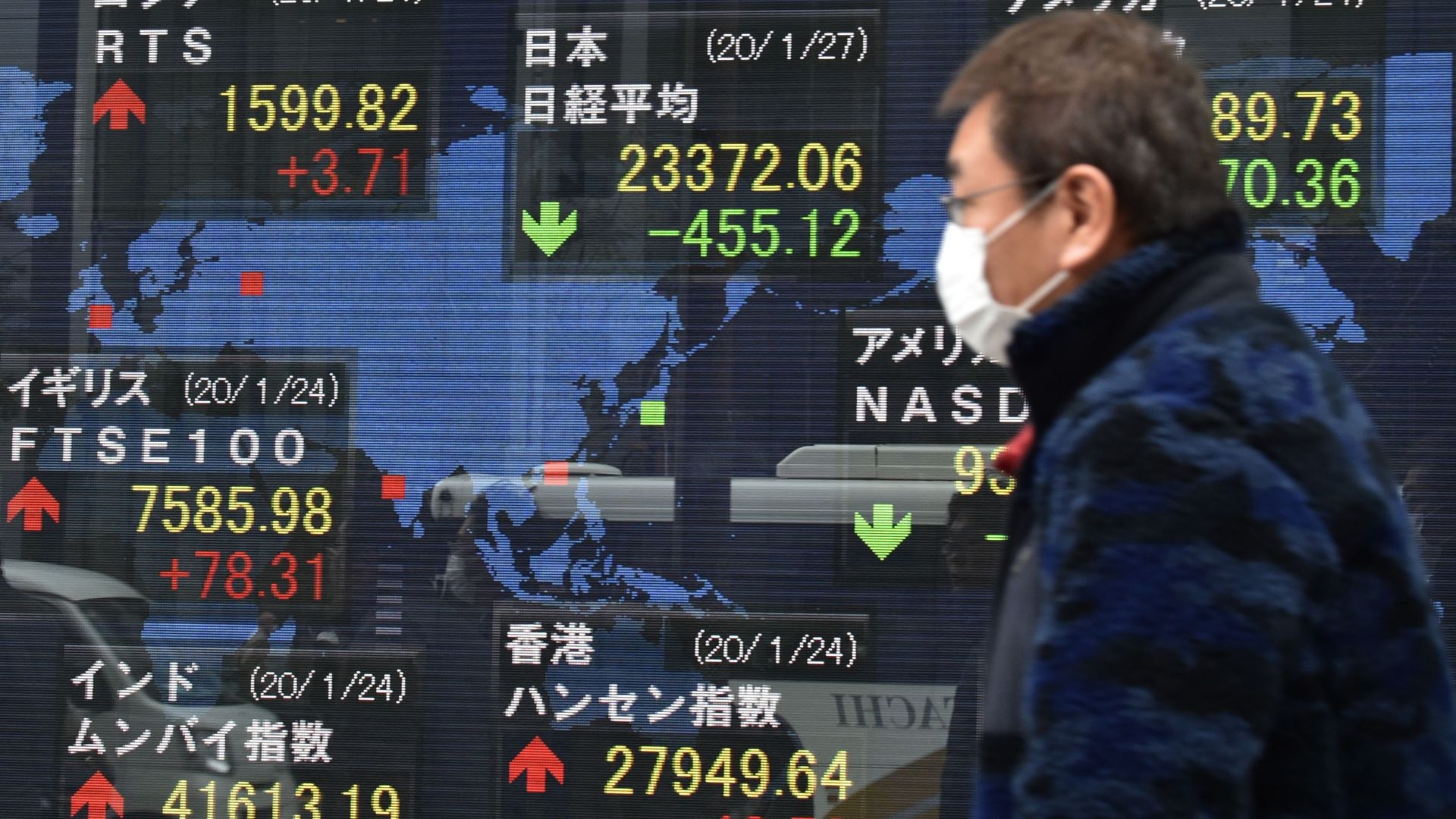Coronavirus fears start to weigh on global business, stock markets
Add Axios as your preferred source to
see more of our stories on Google.

Photo: KAZUHIRO NOGI/AFP via Getty Images
Worry about the Wuhan coronavirus is beginning to have a serious effect on business as new cases are discovered worldwide and China ramps up efforts to contain its spread.
What's happening: China extended its Lunar New Year holiday until Feb. 2 from Jan. 30, to help deal with the outbreak, as the country's death toll rose to 80 and the number of confirmed cases reached upwards of 2,700.
- The number of cases outside of China also has risen, with the U.S., Japan, Hong Kong, Canada and South Korea confirming more over the weekend.
Threat level: Most Asian markets were closed for holidays, but those that were open reacted strongly overnight.
- Japan's benchmark Nikkei index fell more than 2% as the yen touched its highest value against the dollar in close to three weeks.
- Indonesia's JSX Composite dropped by nearly 2%.
- Thailand's benchmark SET index slumped by as much as 3%.
- Crude oil prices slid again, with WTI and Brent both down by around 3%.
Plus, equities outside the Pacific also suffered. The pan-European Stoxx 50 index, which tracks many of Europe's largest companies, fell by more than 2%, Russia's RTS declined by 3% and S&P 500 futures were lower by around 1.5%.
State of play: Several Chinese cities remain on lockdown and the government has said it will ban all outgoing overseas group tours, while Hong Kong announced it would bar residents of Wuhan's Hubei province from entering.
But, but, but: The coronavirus outbreak so far still pales in comparison to the death toll from the much more common flu (influenza) that kills around half a million people each year.
A slate of American companies also could see near-term hits, as WSJ reports the outbreak is already affecting bottom lines, including closures of businesses inside China.
- Walt Disney temporarily closed its Disneyland and Disneytown parks in Shanghai on Saturday.
- McDonald's, which has 2,902 stores in China, said it has closed stores in Wuhan.
- Starbucks said Saturday it would shut all stores in Hubei province, after earlier closing its Wuhan stores.
- Delta, United and American Airlines are allowing passengers traveling between certain Chinese cities to change flights for free and are refunding tickets to Wuhan.
- Carnival and Royal Caribbean Cruises said they aren't allowing anyone who lives in or recently passed through Wuhan to board.
- Marriott, Hyatt and Hilton said they are waiving some cancellation fees for reservations at hotels in China and for guests from China traveling to hotels in other countries.
- DuPont said it would donate equipment to agencies in China that are handling medical cases and would work to increase supply of its products to meet customer demand.
The big picture: Wuhan, China, which essentially has been quarantined as ground zero for the virus, is an important hub for Chinese manufacturing, South China Morning Post notes.
- Wuhan serves as the headquarters for major car and steel producers, has invested heavily in high tech, and acts as a transport and industrial hub for central China.
- The Economist Intelligence Unit estimates that the virus could cut 0.5 to 1 percentage point from China's GDP this year, which many already are expecting to fall below 6%.
- S&P Global warns that if the outbreak worsens it could take as much as 1.2 percentage points off China's economic growth.
Go deeper:
